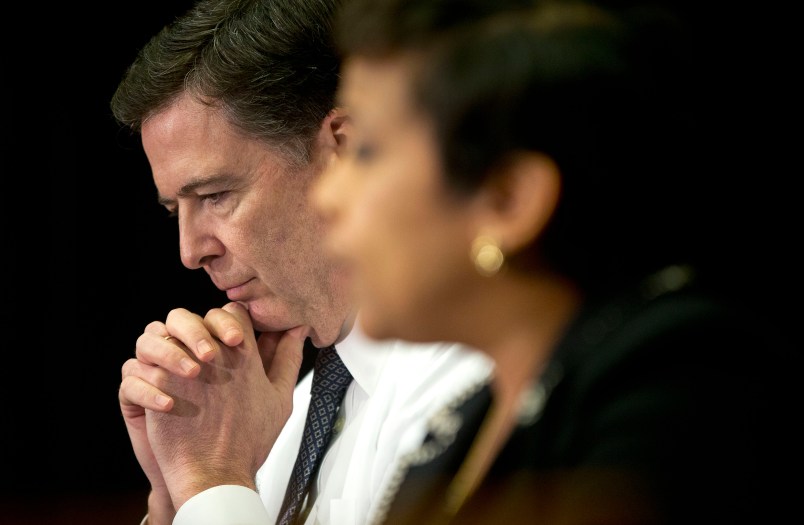We’ve just had some highly disturbing, vaguely surreal new information reported by CNN. Two days ago The Washington Post reported that James Comey’s decision not to notify the Department of Justice about his July Clinton emails press conference was driven in part by emails or documents describing emails the FBI had found in troves of Russian-hacked emails which appeared to compromise Attorney General Lynch’s independence. The gist of the Post story was that Comey may have relied on what was in fact an exquisitely successful disinformation operation to make what turned out to be a highly consequential decision affecting the 2016 election.
This new CNN story contains an important twist.
According to sources who talked to CNN, Comey and the FBI knew the document was a fraud but used it anyway, both to make the decision and justify the decision after the fact.
This isn’t necessarily quite as crazy as it sounds. Comey’s apparent reasoning was that if the document was later released in a Russian/Wikileaks document dump, the fact that it was fake wouldn’t necessarily matter. The Bureau wouldn’t necessarily be able to publicly prove it was a phony without disclosing sources and methods, or perhaps not at all. The point being, whether or not the document was real didn’t really matter. Its release would potentially discredit the integrity of the DOJ/FBI decision making either way.
Two points seem worth noting.
First, we’re dealing with conclusions that are inherently uncertain. You seldom definitively determine that a document is fake. It’s more a preponderance of evidence. It also seems like the consensus opinion on the document’s authenticity evolved over time, with less and less credence being given to it and time went on. The issue here is that it seems like almost everyone involved would have some reason to shade their recollection of events and their relative certainty about key matters to shape the best story possible. That doesn’t even get into knowing deception. It just seems like there’s a lot of gray area and we should keep that in mind.
A second point. The anti-Hillary people (both legitimate opponents and Sputniknews nutballs) always poo-poohed the idea that fraudulent documents might be woven into the legitimate, stolen documents that were laundered through Wikileaks. At least in those, I know of no cases where this happened. But the ability to do this (which is what Comey seems to have feared, if we take this account at face value) is always part of such an operation. Always.
The big takeaway here is that the Russian interference and subversion campaign appears to have gone much deeper and reached much higher than we’ve heretofore known. Whichever version of events you credit, Russian disinformation operations seem to have reached to the very top of the law enforcement and national security state and driven critical decisions at that level. Remember, the October 28th letter to Congress flowed directly from commitments Comey made because of that July press conference. The impact of this decision was quite simply vast.






